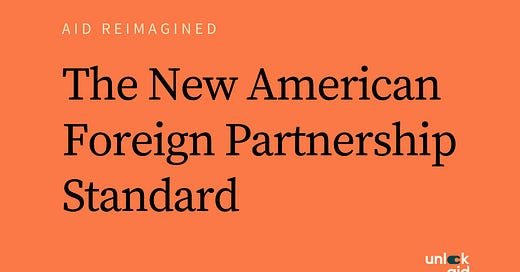Launching A New Standard for U.S. Global Engagement
Shifting the Binary Debate: Building the #AidWeWant
Dear Unlock Aid community,
The current freeze in U.S. foreign assistance has disrupted life-saving programs across the globe. It’s a serious moment — one that demands urgency, clarity, and resolve from all of us who care deeply about how America shows up in the world.
In recent weeks, we've mobilized to help meet immediate needs. But this moment isn’t just about emergency response. It’s also about where we go from here — and who gets to shape what comes next.
Meeting Urgent Needs While Planning for the Future
Since the aid freeze was announced, our coalition has taken action on multiple fronts:
Launched the Foreign Aid Bridge Fund with philanthropic partners to support frontline organizations. Our Grants Investment Committee began reviewing emergency requests from over 400 organizations within days, helping sustain critical programs.
Organized thousands of constituents to contact key lawmakers, urging the administration to lift stop-work orders on humanitarian and life-saving programs.
Hosted live “Ask Me Anything” legal sessions for hundreds of social innovators navigating this uncertainty and exploring their options.
Engaged directly with Congress, sharing real-time impacts and advocating for a more effective path forward.
These efforts address immediate needs, but the conversation about the future of U.S. foreign aid requires more than crisis response.
Moving Beyond Outdated Choices
The current debate about the future of U.S. foreign aid is trapped in a false, binary choice that limits our thinking: either defend the status quo or drastically cut funding. This oversimplified framing serves neither American interests nor those of our partners around the world.
We believe there's a better alternative: a third path.
Two years ago, we launched a global listening tour engaging hundreds of social innovators, entrepreneurs, investors, diaspora groups, national security experts, and faith communities across the United States and around the world. We asked a fundamental question: If we could start over, what would we do differently?
This wasn't theoretical planning. It was preparation. Last year, we warned in Foreign Policy that, if elected, President Trump would likely attempt to eliminate U.S. foreign aid. We urged proponents to develop a better model rather than simply opposing changes.
Today, we're proud to announce Aid Reimagined: The New American Foreign Partnership Standard — our blueprint for the #AidWeWant that offers a third path forward.
Built directly from what we heard during our listening tour and adapted to meet today's urgent challenges, it's a standard that serves American interests while creating sustainable partnerships globally.
Aid Reimagined: The New American Foreign Partnership Standard
This is our blueprint for the #AidWeWant — a practical, principled framework that reflects what we’ve heard from people around the world and responds to the needs of today and tomorrow.
Advancing What Works
A new approach for U.S. foreign aid is built on six core principles for advancing what works:
Promote Jobs & Economic Growth: Prioritize investments that promote jobs and economic growth while securing new markets for U.S. products and services.
Protect Public Health: Prioritize investments that promote strong health systems that prevent, detect, and respond to infectious diseases that are essential to both global and national security.
Invest in Innovation, Scale What Works: Leverage technology and innovation to bring down costs, deliver faster results, and scale what works.
Drive Mutually-Beneficial Partnerships: Transform traditional aid relationships into mutually-beneficial partnerships where host countries have agency and co-invest —ensuring Americans don’t shoulder indefinite financial burdens while building strong, self-reliant partners abroad.
Prioritize Results Over Process: Focus on paying for measurable results rather than activities, with accountability for impact and metrics that benefit partner countries and the United States.
Require Strategic Exits, Self-Reliance: Design all foreign engagements with fixed end dates, self-sustainability or clear transition plans to local actors.
Stopping What Doesn’t Work
We must also commit to stopping approaches that have proven ineffective or counterproductive:
Stop Programs Without Clear Transitions: Reject approaches that make the U.S. the sole foreign aid funder with no sustainability plans or transition strategies for local ownership.
Stop Bureaucratic Barriers: Stop bureaucratic processes and red tape that slow things down and exclude more innovative local actors and private sector players from contributing.
Stop Low-Impact Projects: Move beyond investments with limited scale to those that drive systematic change and sustainable economic growth.
Stop Top-Down Programs: Stop developing aid projects in Washington, DC that lack buy-in or co-investment from host countries, jeopardizing sustainability.
Stop Funding Middlemen: End reliance on the aid industry and instead fund those closest to the challenges, increasing sustainability, cost-effectiveness, and self-reliance.
Help Shape What Comes Next
This morning, we shared these standards with Secretary of State Marco Rubio and congressional leaders. Read our letter here. But this is just the beginning — and we want your voice in the process.
Here’s how you can help:
Share our posts on LinkedIn and X about new standards to help us launch our new #AidWeWant campaign.
Sign up to get involved with our six-week campaign to shift the narrative, contribute ideas, and build a new future for U.S. engagement with the world.
A Moment to Lead
America’s global investments matter — not just for the communities they support abroad, but for the jobs, health, and security they safeguard here at home.
The question is no longer whether we need to change — but how. This moment requires new thinking, new coalitions, and a shared commitment to long-term success.
We’re not just reacting to the moment. We’re shaping what comes next.
Let’s build the #AidWeWant — together.
With determination and purpose,
Unlock Aid



